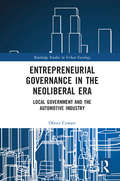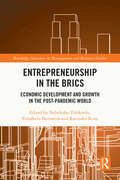- Table View
- List View
Entrepreneurial Governance in the Neoliberal Era: Local Government and the Automotive Industry (Routledge Studies in Urban Sociology)
by Oliver CowartAgainst the background of a growing tendency among state and local governments in the United States to vie against one another, spending public funds, and foregoing corporate tax revenues in order to attract private investment, this book offers an analysis of local economic development and business recruitment in the automotive industry. Asking why localities felt they could – and, more importantly, should – make deals with private capital in the first place, this book examines the shift toward entrepreneurial local governance from a global and historically informed perspective. Through a study of the 19 greenfield automotive assembly plants constructed in the United States during the neoliberal era, the author draws on interviews with corporate and government elites, to chart the connections between increasingly global competitive industry pressures and changing attitudes toward “incentivizing” private investment. Studying the development of an approach that has partially reoriented local governments away from managing localities and towards helping manage transnational capital flows by absorbing some of the increasing risk of long-term capital investment, Entrepreneurial Governance in the Neoliberal Era will appeal to scholars of sociology, politics, and urban studies with interests in globalization, the sociology of work and industry, the sociology of development, and neoliberal governance.
Entrepreneurial Vernacular: Developers' Subdivisions in the 1920s (Creating the North American Landscape)
by Carolyn S. LoebDuring the 1920s, enterprising realtors, housing professionals, and builders developed the models that became the inspiration for the subdivision tract housing now commonplace in the U.S.Originally published in 2001. Suburban subdivisions of individual family homes are so familiar a part of the American landscape that it is hard to imagine a time when they were not common in the U. S. The shift to large-scale speculative subdivisions is usually attributed to the period after World War II. In Entrepreneurial Vernacular: Developers' Subdivisions in the 1920s, Carolyn S. Loeb shows that the precedents for this change in single-family home design were the result of concerted efforts by entrepreneurial realtors and other housing professionals during the 1920s. In her discussion of the historical and structural forces that propelled this change, Loeb focuses on three typical speculative subdivisions of the 1920s and on the realtors, architects, and building-craftsmen who designed and constructed them. These examples highlight the "shared set of planning and design concerns" that animated realtors (whom Loeb sees as having played the "key role" in this process) and the network of housing experts with whom they associated. Decentralized and loosely coordinated, this network promoted home ownership through flexible strategies of design, planning, financing, and construction which the author describes as a new and "entrepreneurial" vernacular.
Entrepreneurial and Innovative Practices in Public Institutions
by João Leitão Helena AlvesThis volume discusses the importance of adopting entrepreneurial and innovation practices in the public sector, as mechanisms for detecting, dealing with and including citizens' social needs, with a reflection on positive determination of their quality of life. It focuses on critical reflection and rethinking the articulation between the dimensions of transformation - entrepreneurship and innovation - of New Public Management (NPM). In this way the book contributes to deepening knowledge about the implications of this change in the organizational paradigm of the public sector for citizens' quality of life, which is treated multi-dimensionally here, including citizens' well-being, purchasing power, happiness, trust, safety, experience and satisfaction. The volume constitutes a reference guide for decision makers, managers and policy makers engaged in the public sector who want to differentiate their performance by fostering entrepreneurial and innovative practices in the scope of public administration that can enhance citizens' quality of life. This volume is also a reference guide for scholars, policy makers and practitioners interested on public innovation.
Entrepreneurship Business Debates: Multidimensional Perspectives across Geo-political Frontiers
by Vanessa RattenThis book introduces entrepreneurship as a concept that is popular in the general media but also in academic study. What is evident is due to its positive and negative connotations in society. This book identifies that it is important to debate the topic of entrepreneurship in order to understand its multi-faceted nature. This edited book includes a number of chapters that discuss multidimensional perspectives from an international perspective. This book emphasizes the geo-political frontiers related to entrepreneurship based on current debates, which includes recent global changes.This book also challenges the debatable as to whether entrepreneurship should be examined at the individual, firm, regional, or industry level. This book goes further to demonstrate that this depends on the type and nature of the study. Therefore, it is better to consider entrepreneurship in a multidimensional way that incorporates different levels of analysis.This book shows each level of analysis that can be considered from a geo-political perspective. This means including an overview of the cultural factors that influence entrepreneurial behavior. In this way, this book helps readers to understand how and why geography and politics influence entrepreneurial action.
Entrepreneurship Ecosystem in the Middle East and North Africa: Dynamics in Trends, Policy and Business Environment (Contributions to Management Science)
by Nezameddin Faghih Mohammad Reza ZaliThis contributed volume explores and reveals the dynamics, strengths and weaknesses, trends and implications of entrepreneurship in the Middle East and North Africa (MENA) region. Presenting papers by respected experts in the field, it shares essential insights on the status quo of entrepreneurship and the opportunities and threats it faces in the MENA region. Topics range from development of entrepreneurial universities to international entrepreneurship, as well as emergent topics such as green entrepreneurship, sustainable entrepreneurship and youth entrepreneurship.
Entrepreneurship Education and Training: The Issue of Effectiveness (Routledge Advances In Management And Business Studies)
by Frances Hill Claire Leitch Colette HenryThis title was first published in 2003. The book covers the areas of: entrepreneurship and economic development; entrepreneurship theories (traditional and alternative); entrepreneurship education and training programmes; a comparative European analysis of entrepreneurship programmes; a profile of the aspiring entrepreneur; assessing effectiveness; and a framework for the design and development of entrepreneurship training programmes. Readers should gain a significant insight into the effectiveness of entrepreneurship training programmes from both the programme providers' and participants' point of view. Key features of the book include: an up-to-date review of the literature in this field; a comparative analysis of entrepreneurship programmes with a European perspective; an in-depth treatment of the effectiveness issue both on a qualitative and quantitative basis, and a longitudinal study involving a control and comparator group. The framework proposed by the authors should be applicable on a European scale.
Entrepreneurship Education at Universities
by David B. Audretsch Christine K. VolkmannThis volume discusses entrepreneurship education in Europe on the basis of in-depth case studies of related activities at twenty higher education institutions. Based on a model of entrepreneurship education, the analysis addresses curricular and extra-curricular teaching, as well as the institutional and stakeholder context of delivering entrepreneurship education within higher educational institutions. The book offers both insightful entrepreneurship teaching practices and a discussion of potential organizational drivers and barriers. Accordingly, it provides a valuable resource for researchers, instructors, and managers of entrepreneurship education alike.
Entrepreneurship and Development in Nepal: Post-COVID Implications (Entrepreneurship and Development in South Asia: Longitudinal Narratives)
by Jay Mitra Pawan Adhikari Shovita Dhakal Adhikari Rupesh Krishna ShresthaThis book illustrates a connection between entrepreneurship and development in an emerging economy context, focusing on Nepal. That entrepreneurship contributes to sustainable development by creating jobs, elevating economic growth, promoting innovation, and mitigating social and environmental challenges is discussed in other works. Entrepreneurship is linked to several sustainable development goals. However, relatively little is known about entrepreneurship in Nepal at an international level and rarely have researchers attempted to explore the relationship between entrepreneurship and development in the Nepalese context. In this regard, this book generates valuable insights, not only contributing to policy implications but also setting a direction for entrepreneurship research in Nepal within a wider context of sustainable development. In particular, the book discusses several important issues on entrepreneurship, including migrant entrepreneurship, entrepreneurial ecosystem, social entrepreneurship, entrepreneurial finance, community-based entrepreneurship, and tourism entrepreneurship, issues which are intrinsically connected to the sustainable development of the country. In addition to policy contributions, the book provides a direction for facilitating theoretically underpinned work in entrepreneurship and development in the Nepalese context. The factors driving entrepreneurship, including specific social-cultural and historical factors that remain relevant for emerging economies, and emancipation, inclusion and participation, which are central to achieving development, are to be theorized in order to better understand the relationship between entrepreneurship and development. The topics covered by the book will be of interest to policy-makers from ministries and departments, international organizations, and development partners.
Entrepreneurship and Structural Change in Dynamic Territories: Contributions From Developed And Developing Countries (Studies On Entrepreneurship, Structural Change And Industrial Dynamics Ser.)
by Luísa Cagica Carvalho Conceição Rego M. Raquel Lucas M. Isabel Sánchez-Hernández Adriana Backx NoronhaEntrepreneurial ecosystems involve a complex synergy of factors, including social and structural changes that are frequently cumulative within territories, promoting the improvement of citizens’ quality of life and higher development levels. Further, dynamic territories are characterized by constant change, activity and progress. Each chapter in this volume examines a specific entrepreneurial ecosystem in an effort to describe why and how certain companies and organizations manage to overcome adversities and achieve strong performance, while others fail. Unlike the conventional focus, the volume examines microenterprises and Small and Medium Enterprises (SMEs), while also discussing selected experiences and case studies from developed and developing countries alike.
Entrepreneurship in Former Yugoslavia: Diversity, Institutional Constraints and Prospects
by Léo-Paul Dana Veland Ramadani Ramo PalalićThis volume offers a comprehensive state-of-the-art portrait of entrepreneurship and small business management issues in former Yugoslavian countries. Further, it provides a wealth of theoretical and empirical evidence on the role of entrepreneurship in transition economies and emerging markets. Country-based studies identify the processes in each country that attract financial investors and yield new business and employment opportunities. In addition, the studies highlight institutional constraints and political factors that hinder the development of entrepreneurship in these countries, and offer recommendations for policymakers on how to improve the general business environment. This book will appeal to entrepreneurship researchers, as well as public policymakers in transition economies and emerging markets.
Entrepreneurship in Healthcare (Routledge Studies in Health Management)
by Ralf Wilden Massimo Garbuio Federica Angeli Daniele MasciaEntrepreneurship in the Healthcare sector has received increased attention over the last two decades, both in terms of scholarly research and number of innovative enterprises. Entrepreneurial activities and innovations have emerged from and will continue to be driven by several actors along the healthcare value chain but especially from non-traditional healthcare players. In this new volume, we present the reader with several critical issues in healthcare entrepreneurship and innovation, covering a comprehensive set of research topics. We bring together the latest academic research and management practice, with contributions by authors from entrepreneurship, medical sciences, and management, who provide in depth and practical insights into designing and managing entrepreneurship in healthcare. Upon providing a systematic review of the research field, we discuss several important macro-, meso-, and micro-level issues in healthcare entrepreneurship, such as opportunity identification, the entrepreneurial ecosystem including accelerators, the benefits of open innovation for the sector, and social entrepreneurship in healthcare. These topics open up avenues for nurturing entrepreneurship in healthcare through both education and policy. Building on this trend, the book is organized around levels of analysis and specifies which cross-disciplinary efforts are needed to advance understanding of how entrepreneurs discover opportunities and start viable and innovative businesses. Healthcare Entrepreneurship will be of interest scholars of health care and entrepreneurs alike, but also managers of innovative health care enterprises as well as policy makers in the health sector.
Entrepreneurship in the BRICS: Economic Development and Growth in the Post-Pandemic World (ISSN)
by Fulufhelo Netswera Ravinder Rena Ndivhuho TshikovhiEntrepreneurship is a tool of innovation promotion that supports sound economic environments as it stimulates economic growth and development. The BRICS nations, i.e., Brazil, Russia, India, China and South Africa, are a group of emerging countries comprising the highest developmental block of the emerging nations. It is imperative to assess the entrepreneurship policies, strategies, promotional programs and their implications on among others, entrepreneurship funding, economic growth, employment trends. The COVID-19 pandemic has impacted the entrepreneurship environment and equally steered state funding priorities away from entrepreneurship development support worldwide. This research book assesses the effect that COVID-19 has had on government funding priority, policy interventions and resultant implications on the entrepreneurship environment, economic growth and employment with a focus on BRICS. Readers will gain insight into what entrepreneurship looks like in the BRICS context and how it has been affected by COVID-19, indicating how the BRICS nations are likely to move forward to further strengthen entrepreneurship. This edited volume will be of interest to researchers, academics, practitioners, and advanced students in the fields of entrepreneurship, innovation, strategy, international relations, multilateralism, and economic development.
Entrepreneurship in the Balkans: Diversity, Support and Prospects
by Veland Ramadani Robert C. SchneiderThis book represents a comprehensive state-of-the-art picture of entrepreneurship and small business management issues in the Balkans region. It provides major theoretical and empirical evidence that offers a brighter view of these fields and aims to open up opportunities for greater dialogue in public policy. The readers would be able to enhance their knowledge on small businesses and innovation issues in the Balkans. An outcome of a long lasting endeavour, this book includes contributions of highly reputed authors and experts from the Balkans' countries. Features forewords by two well-known personalities of this field, Leo Paul Dana and Alain Fayolle.
Entrepreneurship in the Creative Industries: How Innovative Agents, Skills and Networks Interact
by Susan Kerrigan Phillip McIntyre Janet Fulton Michael MeanyThis books provides a critical perspective on entrepreneurialism in the creative industries. Split into three sections, the book first asks the contextual question; why, at this point in time, did we arrive at such a focus on entrepreneurship in the creative industries? Examining the historical, social, cultural, economic and political background, the book places the creative industries and entrepreneurship firmly within a systemic approach to creativity and cultural production. Given this emphasis on entrepreneurship in the creative system, the second part of the book asks, what do those who want to work in the creative industries need to do to pragmatically gain an income? The practices, skills, business models and plans necessary to master in order to successfully run a business are explored in this section. The final section contains detailed case studies that reveal the lives of those who found a way to successfully gain an income in the creative industries. It highlights the practical knowledge they gathered, how they negotiated their field of endeavour, and the decisions they made in the real world.Fundamentally the book answers three questions: How and why did we get here? Given that we are here at this point in time, how do we go about being entrepreneurial? And who has managed to do this in the creative industries and how did they do it? Covering both theoretical debates in detail, and practical case studies in key sub-sectors of creative industries, this truly integrative and far-reaching volume will be of interest to students, researchers and practitioners alike.
Entrepreneurship in the Global Economy
by Henry Kressel Thomas V. LentoEntrepreneurs have long been drivers of innovation in developed countries. They start companies and create new industries that keep economies strong and prosperous. Today, however, in developing nations such as China, state-controlled economies are building robust industries at stunning speed and siphoning off jobs from the West. How can entrepreneurs function in the face of this challenge? Can they continue to create economic value in a globalized business environment? This book addresses the crucial issue of state planning vs. free enterprise and examines specific problems surrounding entrepreneurship in the global economy through nine case histories of entrepreneurial companies. It also looks at how and why government gets involved in economic growth and how entrepreneurs contribute to economic value. Based on this analysis, the authors argue that companies can succeed, even in controlled economies, by understanding the customs and policies of countries where they do business.
Entrepreneurship in the Informal Economy: Models, Approaches and Prospects for Economic Development (Routledge Studies in Entrepreneurship #4)
by Mai Thi Thanh Thai Ekaterina TurkinaAlthough entrepreneurship in the informal economy occurs outside state regulatory systems, informal commercial activities account for an estimated 30% of economic activity around the world. Informal entrepreneurship goes unmonitored despite the fact that it significantly contributes to poverty reduction and economic development. As a result, the informal sector is open to unethical practices including corruption, worker exploitation, and natural environment abuse to name just a few. In the media, debates have formed around whether informal entrepreneurship should be assisted or legitimized. Hence, a deep understanding of the phenomenon is vitally important. This book is the first on the market to offer models and approaches to informal entrepreneurship as well as to its prospects for economic development. Offering an in-depth examination of informal entrepreneurship in many different countries, it reveals the motivations for engaging in entrepreneurship in the informal economy, characteristics of informal entrepreneurship, and informal entrepreneurs’ response to ethical issues. This volume illustrates the relationship between formal and informal economies and the conditions for the benefits of informal entrepreneurship to outweigh its disadvantages. And finally, it gives recommendations about when and how the informal economy can be formalized, which sectors should be formalized, and which ones can remain informal. This book offers much-needed guidance for stakeholders involved in economic development programs and scholars and entrepreneurs interested in the field of informal entrepreneurship as it is developing around the globe.
Entrepreneurship in the Polis: Understanding Political Entrepreneurship (The Ashgate Plus Series in International Relations and Politics)
by Inga Narbutaité Aflaki Evangelia PetridouDynamics of entrepreneurship have attracted growing attention from scholars of political science, policy studies, public administration and planning, as well as more recently, from the realms of international relations and foreign policy analysis. Under the banner of political entrepreneurship, this volume considers and maps out conceptual approaches to the study of entrepreneurship drawn from these fields, discusses synergies, envisages new analytical tools and offers contemporary empirical case studies, illustrating the diverse political contexts in which entrepreneurship takes place in the polis. Drawing upon an international cast of senior academics and cutting edge young researchers, the volume takes a closer look at key aspects of political entrepreneurship, such as, defining political entrepreneurs, how it relates to change, decision-making and strategies, organizational arrangements, institutional rules, varying contexts and future research agendas. By highlighting the political aspects of entrepreneurship, the volume presents new exciting opportunities for understanding entrepreneurial activities at regional, national and international levels. The volume will be of particular relevance to scholars and students of political science, policy studies, public administration, planning, international relations and business studies as well as practitioners interested in the nexus and utility of entrepreneurship in the modern-day political world.
Entrepreneurship, Human Capital, and Regional Development
by Rui Baptista João LeitãoThis book makes original contributions to the literature on clusters, human capital, and regional development by focusing on the link between entrepreneurship and economic growth, aiming for a better understanding of the dynamics of growth determined by the entrepreneur's action in the regional space. The focus is therefore on critical reflection and rethinking the articulation between three levels of analysis of economic systems, namely entrepreneurship, human capital and regional development, which have not so far been perfectly articulated in the literature of reference on endogenous growth. Although there has been significant research so far into the success and failure of clusters, the implications of these multiple research efforts fail to provide political decision-makers and company managers with critical information about which mechanisms lie behind cluster success and also about how clusters survive and prosper. The innovative approaches presented in this book on entrepreneurship, human capital mobility and regional development have considerable potential to create new and original implications for decision-makers and managers. In terms of value added, this book contributes to the literature by seeking answers to the following questions: (i) Is the growth and success of clusters over time due to concentration and transmission of business competences through spin-offs located in a given regional space? (ii) Does increased density of job options outside the workplace contribute to increased mobility of human capital between firms located within clusters, and so improve coordination in the local labor market? (iii) Do spin-offs benefit from hiring workers from successful incumbents, inasmuch as those workers are expected to perform better than other workers from different origins? Integrating theoretical frameworks, empirical research, and regional case studies (from Portugal, Spain, Norway and Turkey), the editors and contributors demonstrate that the regional dynamics of industry growth are strongly influenced by the mobility of employees towards new firms.
Entrepreneurship, Innovation and Economic Crisis
by Marta Peris-Ortiz Klaus Rüdiger Alicia Blanco-GonzálezThis book looks at entrepreneurship and innovation as ways out of the economic crisis in Europe and other regions, and examines the main theoretical issues and practices related to this analysis. The volume addresses such questions as: From an institutional perspective, how do economic crisis conditions affect different types of entrepreneurs and entrepreneurship? Is it useful for public policymakers and entrepreneurs to understand the basic characteristics of entrepreneurial activity, relations between the institutional environment and entrepreneurship and among entrepreneurship, innovation and social change? Featuring case studies from several industries and countries, and a variety of methodological, theoretical, and empirical approaches, the authors build a compelling narrative on the dynamics of entrepreneurship and innovation as drivers of economic growth and organizational renewal. They demonstrate that the strategic and operational relationships that entrepreneurship creates within and outside the enterprise are a fundamental route for leading and mobilizing economic and social resources that permit innovation at the organizational level and in relationships with suppliers, customers, and other stakeholders - in turn, enabling technological innovation, creating new revenue streams through new productive activities and new demand, and ultimately facilitating emergence from economic crisis. The authors consider social, gender, and generational aspects of entrepreneurship, as well as the institutional conditions necessary to promote entrepreneurial activity.
Entrepreneurship, Polycentrism, and Elites: Local Industrial Development in Modern Italy
by Carlo Carboni Francesco OraziThe book is a cross-section of the over all Italian development. Italy can be considered a microcosm that contains all the imbalances and territorial differences that can be observed in the European macro-areas. Its north can now be considred integrated with the more developed European continental shelf. The Centre represents a local development in transition to a more visible technological change. The late south risks accumulating more socio-economic backwardness. For these reasons, we believe this volume is useful, with just a few pages presenting one of the most interesting cases of local industrial development, outside the mainstream of the industrial economy which saw in Fordism and Taylorism the best way for industrializaion. Here, on the contrary, it is argued that big fish cannot always consume the smallest one that flickers faster and its flexibility, that has social roots, can be an advantage in global markets. Technology appears to be the key to the future. Please note: This title is co-published with Aakar Books, New Delhi. Print edition not for sale in South Asia (India, Sri Lanka, Nepal, Bangladesh, Pakistan, Maldives or Bhutan)
Entrepreneurship, Small Business and Public Policy: Evolution and revolution (Routledge Masters in Entrepreneurship)
by Robert J. BennettPublic policy interventions aimed at encouraging, supporting and developing small businesses are important for understanding entrepreneurship and small business management. This textbook is the first to provide teachers and students with a resource that gives an overview of how institutional and policy structures interact with small firm start-ups, continuation and succession/failures. Beginning with a brief introduction to policy processes, the text covers the main policy instruments for entrepreneurial market entry and start-up support, for on-going small business advice and financial support, and succession planning. It particularly focuses on policies that improve the Business Enabling Environment through macroeconomic policy, institutional reform, and deregulation of bureaucratic burdens. Theoretical rigour is complemented by detailed assessments of current policies around the world, including USA, advanced and emerging economies and Policy support from global institutions such as the World Bank and the ILO are included. Written by a pre-eminent scholar of public policy and entrepreneurship, this textbook provides a concise but thorough introduction to the subject for Master's students internationally. Policy recommendations in the author's conclusion also highlight the book's value to policy-makers as they adapt to the globalized, digital world.
Entrepreneurship: Venture Initiation, Management and Development
by George Vozikis Timothy Mescon Howard Feldman Eric W LiguoriThe authors present core concepts of entrepreneurship in an easy-to-follow, logical sequence. Starting with basic definitions and an overarching conceptual framework in Part I, the book then addresses topics pertaining to Venture Initiation (Part II), Venture Management (Part III), and Venture Development (Part IV). Each chapter contains a case study in which a real-life entrepreneur, who confronts the issues of growth and competition, is followed. Venture initiation and development are key components of this book.Entrepreneurship has all the standard features that entrepreneurs-in-training need. The book's strength, however, lies in the clear, straightforward, and logical manner in which the various topics within this complex subject are presented. The book also includes learning objectives, outlines, terms, and review questions.
Entry Lessons: The Stories of Women Fighting for Their Place, Their Children, and Their Futures After Incarceration
by Jorja LeapThrough oral histories, interviews, embedded observation, and research, the daily struggles of women returning to life after incarceration and concrete solutions to the seemingly hopeless issue.At the end of 2019 in the United States, women comprised the fastest growing population within the criminal justice system. Despite this fact, their journey through this system has not received extensive attention; it is only beginning to be documented. As a result, the impact of women&’s incarceration and reentry—both on their own lives and in the lives of their children and their families—is neither well understood nor effectively confronted.Sociologist Jorja Leap argues that all aspects of these women&’s journey must be illuminated to fully grasp the issues. Leap explores first the traumas girls and women suffer, then the particular challenges faced by women in the criminal justice system, in incarceration, and throughout the reentry process. Leap tells the stories of women who suffer childhood abuse and neglect, including for example, Clara, who suffered twice—once as a child within the welfare system and then as a mother whose children were removed from her care and placed within the system—highlighting the ways the system fails women in particular. She finds that the lack of reentry programs is directly related to rates of recidivism, concluding that the cycle of trauma is the embedded in the system of reentry.Having spent countless hours embedded in the reentry programs that do currently exist, including Susan Burton's A New Way of Life, Leap tells the dramatic stories of many women caught in the system, She closes with several future-facing chapters. The experiences of formerly incarcerated women must be translated into lasting structural change through the development of meaningful programs and policies. Leap delves into pilot programs that offer meaningful models for changing the cycles of abuse and trauma in the lives of women.
Entryism and the Revolutionary Socialist Left in Britain (Routledge Studies in Modern British History)
by Nicolas SigoillotThis book examines entryism in the context of the revolutionary socialist left in Britain, from the inception of the Communist Party of Great Britain in 1920 to the departure of Militant from the Labour Party in 1992. Entryism is a tactic of penetration of a political party by another, aimed at accomplishing objectives, the nature of which can change depending on the type of entry. This work shows to what extent there is not one type of entryism but several. The adopted methodology is chronological, with introductory chapters that study the context and the previous partial-only attempts to define entryism. The first part of the volume is dedicated to the relationship between the Communist Party of Great Britain and the Labour Party up until the middle of the 20th century. The following two parts are dedicated to British tTotskyists before and after the Second World War. In total, 17 organisations that have practiced entryism are examined. Through their objectives, practices, and results, this work intends to formulate an exhaustive typology of the tactic, which fills a definitional gap in political science and covers an aspect of Labour’s History that has only been partially covered. This volume will be of use to students and scholars interested in the history of the Labour Party and the Far Left in the United Kingdom.
Entryism and the Revolutionary Socialist Left in Britain (Routledge Studies in Modern British History)
by Nicolas SigoillotThis book examines entryism in the context of the revolutionary socialist left in Britain, from the inception of the Communist Party of Great Britain in 1920 to the departure of Militant from the Labour Party in 1992.Entryism is a tactic of penetration of a political party by another, aimed at accomplishing objectives, the nature of which can change depending on the type of entry. This work shows to what extent there is not one type of entryism but several. The adopted methodology is chronological, with introductory chapters that study the context and the previous partial-only attempts to define entryism. The first part of the volume is dedicated to the relationship between the Communist Party of Great Britain and the Labour Party up until the middle of the 20th century. The following two parts are dedicated to British Trotskyists before and after the Second World War. In total, 17 organisations that have practiced entryism are examined. Through their objectives, practices, and results, this work intends to formulate an exhaustive typology of the tactic, which fills a definitional gap in political science and covers an aspect of Labour’s History that has only been partially covered. This volume will be of use to students and scholars interested in the history of the Labour Party and the Far Left in the United Kingdom.























